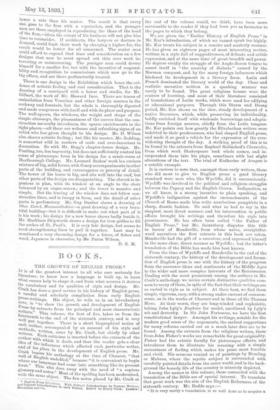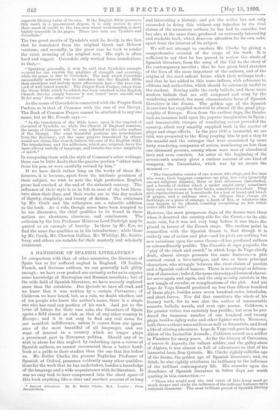BOOKS.
THE GROWTH OF ENGLISH PROSE.* Is, is of the greatest interest to all who care seriously for literature, to know how a language is built up, to learn what causes help to shape it, and from what sources it derives its vocabulary and its qualities of style and design. Mr. Craik has done a good service in his history of English prose, a careful and scholarly compilation from early English Prose-writings. His object, he tells us in an introductory note, is " to show the growth and development of English Prose by extracts from the principal and most characteristic 'writers." This volume, the first of five, takes us from the fourteenth to the end of the sixteenth century, and is very well put together. There is a short biographical notice of eac,h, author, accompanied by an account of his style and methods, written, some by Mr. Craik, but chiefly by other writers. Each criticism is inserted before the extracts of the author with which it deals, and thus the reader gets a clear idea of the influences which affected each particular writer, and of his place in the development of English prose. Mr. o begins his anthology at the time of Chaucer, "that well of English undefiled," because "it is convenient to begin where ,,our language had come into something like its present f orm. This also does away with the need of " a copious glossary and notes."
Most of the spelling has been modernised, with the same object. The few notes placed by Mr. Craik at
ROnelar718Sotee°8tthCrltir1iktradutknBbyVariWrite.and lin:0dustiol:&) each period. EditedbyHenry Crack. London Macmillan and Co.
the end of the volume would, we think, have been more serviceable to the reader if they had been put as footnotes to the pages to which they belong.
We are given the " Earlier History of English Prose" in Mr. Kees introduction, of which we cannot speak too highly. Mr. Ker treats his subject in a concise and masterly manner. He has given us eighteen pages of most interesting matter, written in a style full of suggestiveness, of delicate and subtle expression, and at the same time of great breadth and power.
He depicts vividly the struggle of the Anglo-Saxon tongue to assert itself in "the anarchy of dialects" caused by the Norman conquest, and by the many foreign influences which hindered its development in a literary form. Latin and French dominated the literary world of the day. Clear and realistic narrative written in a speaking manner was rarely to be found. The great religious houses were the centres of learning, and most of their literature consisted of translations of Latin works, which were used for edifying or educational purposes. Through this Sturm and Drang period, Mr. Ker shows us the slow, steady development of a native literature, which, while preserving its individuality, boldly enriched itself with wholesale borrowings and adapta- tions from foreign sources, chiefly from the Latin tongues.
Mr. Ker points out how greatly the Elizabethan writers were indebted to their predecessors, who had shaped English prose, and made it so good a vehicle for the expression of the ever- widening thought of the day. A striking proof of this is to be found in the extracts from Raphael Holinshed's Chronicles, from which work Shakespeare took whole scenes, and in- corporated them into his plays, sometimes with but slight alterations of the text. The trial of Katherine of Aragon is a notable example.
It is curious to note that, amongst these early writers, those who did most to give to English prose a good literary standard were men who, like Wycliffe, did it unconsciously.
Wycliffe was involved in the political and religious struggles between the Papacy and the English Crown. Indignation, as we all know, is a strong incentive to plain speaking, and Wycliffe's indignation against the encroachments of the Church of Rome made him write numberless pamphlets in a sharp, drastic fashion. He said what he had to say in the simplest, most direct manner, and his intervention in public- affairs brought his writings and therefore his style into prominence. He has often been called " the Father of English Prose," but Mr. Saintsbury disputes this title in favour of Mandeville, from whose naïve, straightfor- ward narratives the first extracts in this book are taken. Mandeville had the gift of a raconteur, and expressed himself in the same clear, direct manner as Wycliffe ; but the latter's translation of the Bible has made him best known.
From the time of Wycliffe and Mandeville to the end of the sixteenth century, the history of the development and forma- tion of English prose is one with the history of the progress from the narrower ideas and sentiments of the Middle Ages to the wider and more complex interests of the Renaissance. Dealing with the most prominent among the authors in Mr.
Oraik's anthology, we notice certain distinctive qualities com- mon to many of them, in spite of the fact that their writings are as varied in style as in subject. At their best, we find them simple, vigorous, racy, with a strong under-current of common- sense, as in the works of Chaucer and in those of Sir Thomas More. At their worst, they are long-winded and euphuistic, taking John Lyly's Eupltues for model, unrelieved by Lyly's wit and dexterity. In Sir John Fortesoue, we have the first constitutional lawyer. Amongst his writings, notable for the modern good sense of the arguments, the earliest suggestions for many reforms oarried out at a much later date are to be found. Among the extracts from the religious writers, those from John Fisher's works are remarkable for great originality.
Fisher had the artistic faculty for picturesque effects, and introduces them to illustrate his meaning with a simple earnestness of feeling which makes his prose most forcible and vivid. His sermons remind us of paintings by Memling or Mabuse, where the mystic subject is surrounded with carefully painted details from the outer world, and in the back- ground the homely life of the country is minutely depicted.
Among the names in this volume, those connected with the translation of the Bible are of special interest. To translate that great work was the aim of the English Reformers of the sixteenth century. Mr. Dodds says:- " It is very rarely a translation is so well done as to acquire a
separate literary value of its own. If the English Bible possesses this merit in a pre-eminent degree, it is only justice to give their meed of credit to the two men whose workmanship is most highly traceable in its pages. These two men are Tyndale and Coverdale."
The two great merits of Tyndale's work lie, firstly, in the fact that he translated from the original Greek and Hebrew versions ; and secondly, in the great care he took to render the exact meaning of the original text. His style is often hard and rugged. Coverdale only worked from translations, eo that,— " Speaking generally, it may be said that Tyndale's example secured for our version the qualities of strength and accuracy, while its grace is due to Coverdale. The task which Coverdale successfully achieved was to introduce into the English Bible that sweetness and melody never afterwards lost= the true con- cord of well tuned sounds.' The Prayer-Book Psalter, taken from the Great Bible which he edited, has been retained in the English Church Service simply because it was found `more smooth and fit for song' than other versions."
As the name of Coverdale is connected with the Prayer-Book Psalter, so is that of Cranmer with the rest of our liturgy. The Book of Common Prayer cannot be attributed to any one name, but as Mr. Froude says :— " As the translation of the Bible bears upon it the imprint of the mind of Tyndale, so, while the Church of England remains, the imago of Cranmer will be seen reflected on the calm surface of the liturgy. The most beautiful portions are translations from the Breviary ; yet the same prayers translated by others would not chime like church belle in the ears of the English child. The translations and the addresses, which are original, have the same silvery melody of language, and breathe the same simplicity of spirit."
In comparing them with the style of Cranmer's other writings, there can be little doubt that the greater portion ' either came from his pen, or were carefully revised by him."
If we have dwelt rather long on the works of these Re- formers, it is because, apart from the intrinsic greatness of their subject, we wish to note the high perfection English prose had reached at the end of the sixteenth century. The influence of their style is to be felt in most of the best litera- ture since their time, and their works are to this day models of dignity, simplicity, and beauty of diction. The criticisms by Mr. Craik and his colleagues are a valuable addition to the book. As a rule, though some have been tempted to be too discursive, the chief qualities to be found in these notices are shortness, clearness, and conciseness. The criticism by the late Professor Minto on Lord Burleigh may be quoted as an example of brevity. In those by Mr. Ker, we find the same fine qualities as in his introduction ; while those by Mr. Craik, Mr. Churton Collins, Mr. Whibley, Mr. Saints- bury, and others are notable for their masterly and scholarly treatment.



































 Previous page
Previous page